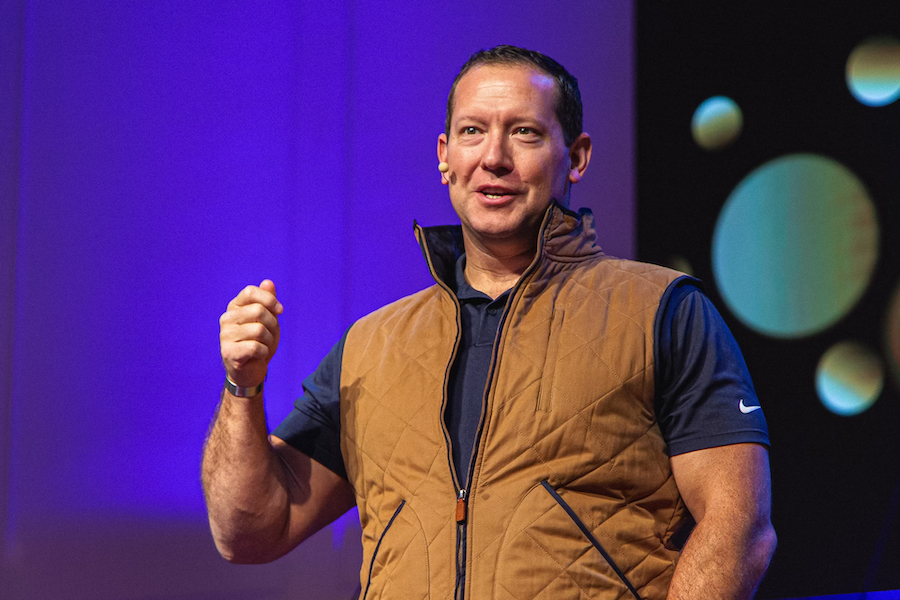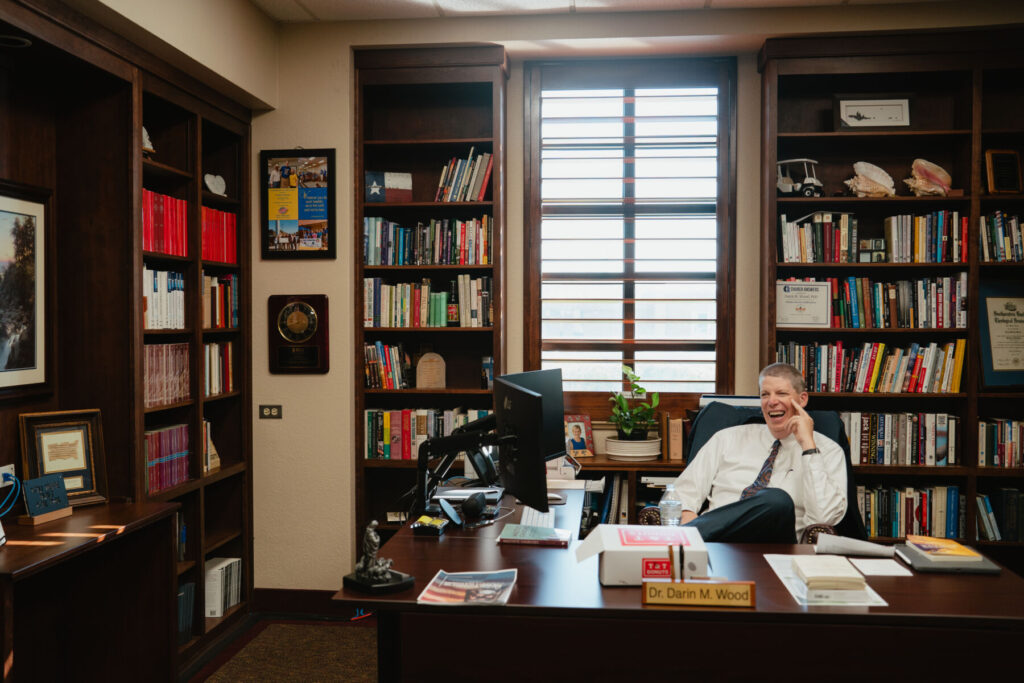Kuglin family helps Congolese know truths of Scripture, dispute false teaching
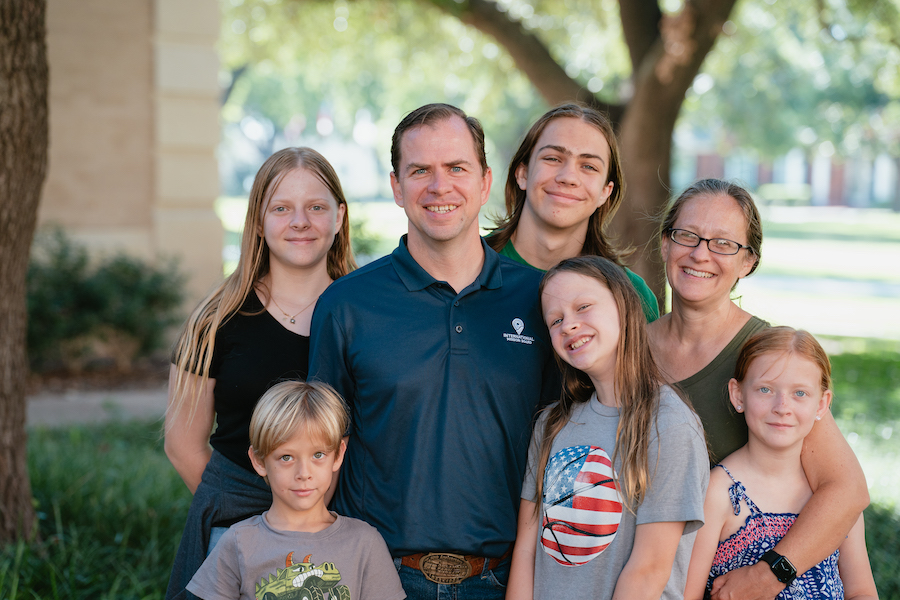
As they walked around the campus looking for pecans and feeding the koi fish during a recent visit, the Kuglin children began to remember an earlier time when they frequented Southwestern Baptist Theological Seminary at an even younger age. But for the past seven years, their home has been Africa.
In 2017, alumnus Aaron Kuglin (’21) took his young family to the Democratic Republic of Congo (DRC) to become International Mission Board missionaries on the continent which, in the past decade, has become a hub of Christianity, with more professing believers there than any other continent.
Born in Minnesota, Kuglin moved to Florida at seven years old when his parents became involved in mission work there. He grew up with a love and skill in music and earned an undergraduate degree in that field from the Moody Bible Institute before serving as the minister of music at a church in Georgia, where he met his wife, Kristy, who grew up in Oklahoma.
But at that time, Kuglin started to feel drawn toward doing something different in ministry.
“When I was doing full-time music ministry in a church in the United States, I just felt more of a draw to do a little bit more, not just at home,” Kuglin said. “… The draw to work with people, not just in the United States but on the front lines, was formulating in my mind from 2006 to 2010, and then 2010 really was when we set our goal towards missions.”
Realizing he needed further education to prepare to serve with the IMB, Kuglin brought his growing family to Southwestern in 2010 and began pursuing his Master of Divinity in international church planting, with the goal of getting the basics required to join the IMB. But in that time, Kuglin received training and experience that continue to guide his family in the mission field today.
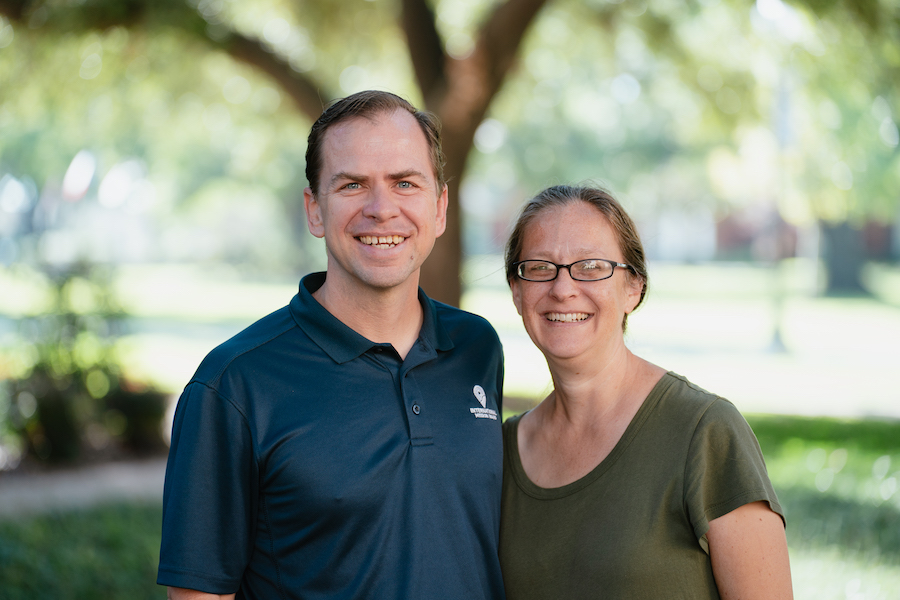
While Aaron attended Southwestern, he and his wife Kristy both gained great experiences that prepared them for the mission field.
While studying at Southwestern, Kuglin and Kristy were encouraged by the IMB to find ways to gain more international experience, so they began to participate in mission trips led by faculty and others. For four summers in a row, they found themselves participating in annual trips to the DRC, the second largest country in Africa.
“It was a real cool way of God knitting our hearts to the Congolese and opening our eyes to that,” Kuglin said of those trips.
Their family also moved to an apartment complex in Fort Worth that housed a large percentage of refugees, regularly attended an Iranian church service held in the Farsi language, taught at an African church monthly, and even enrolled their children in a school with students that spoke different languages. All these experiences, and the teaching of professors such as missions professor Mike Morris and New Testament professor Paul Hoskins, prepared Kuglin and his family for the mission field.
While attending an IMB expo on campus after their third short-term trip to the DRC, Kuglin heard of a job opening there for an ethnomusicologist. Already having experience in music and having spent time in dialogue with music professors on campus, Kuglin said this opportunity seemed like the perfect melding of missions and music as it allows him to help African Christians create their own worship songs in their native tongues and styles.
So after seven years as a full- and part-time student on campus, as their family grew to seven members and Kuglin worked in the music library, the Kuglins took the opportunity to move to the Congo in 2017. He completed his final classes while in the field, his parents accepting his degree on his behalf in 2021.
The Kuglin family serves in the capital city of Kinshasa, one of the fasted growing cities in the world with about 17 million people living there, the largest city in the country, and the largest French-speaking city in the world. In recent years, the Kuglin family has gone from being one of several IMB teams and families in Kinshasa, to now facing 2025 as the only missionary couple there as others move away or retire. Kuglin said a constant prayer request is that more laborers for the Gospel would join them in the large city and country.
The Congo is considered a Christian nation, with about 50 percent of the population living as Roman Catholics and 20 percent professing to be protestant. Kuglin said many people there know about Jesus because of the deep history of mission work there through individuals such as David Livingstone. But Kuglin said some of the churches they have visited he would not want to see reproduced, because in some instances those professing believers do not seem to believe that Jesus is the only way of salvation, but another figure they can add to their syncretistic system of religion.
Kuglin said his seminary training has helped him greatly when facing these false teachings and false forms of Christianity.
“One of the things that we have stressed for those that are looking to come on with us,” Kuglin explained, “is that theological education in a deeper way is very needed for those that are there long term, because there’s so much in our area of African tradition religion syncretized in with the church and prosperity gospel and false teachings. My time [at Southwestern] really prepared me to single those out and know how to respond to them.”
Even those believers who do believe in Christ alone for salvation often still face the pressure of their culture around them to take actions to protect themselves and their families from evil spirits. Kuglin explained that the culture often addresses the spirit of poverty, the spirit of war, and even the spirit of Covid that they must battle against.
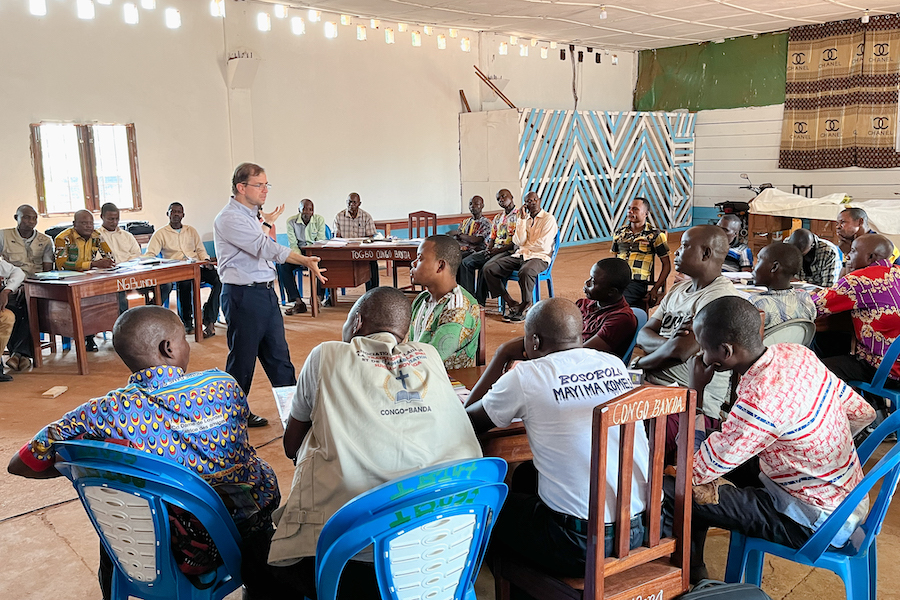
Aaron Kuglin frequently visits churches and trains believers and pastors in the Scriptures through story-telling.
“Any chance I get to speak with pastors one-on-one,” Kuglin said, “I’ll ask the question, ‘Spiritually speaking, as the shepherd of your flock, what’s the biggest spiritual problem?’” Often the pastors would respond with physical problems such as poverty or oppression. “But they will always say something that has to do with fear. Fear, whether it’s fear of evil spirits or fear of their neighbors. … People within churches, they wouldn’t say so… but that’s how they live, and they’re living in fear of if I don’t make sure to protect my family.”
Kuglin said that is why he sees so many Congolese churches turn to what he calls the prosperity gospel, which tells them they can have control over their own security through combat prayer and casting out of demons.
“That’s probably our biggest battle, is helping them realize that your efforts don’t do anything apart from what Christ has done,” Kuglin said.
While looking out for false teaching in the churches, Kuglin also said they have had to practice discernment as well when trying to determine if something in the church they serve or visit is wrong or just different.
“One of the things that I recall very vividly praying, when we would be in a church service,” Kristy Kuglin said, “because it’s so different, I would just sit and pray, ‘God show me what is wrong and what is just different.’ Because it’s amazing how hard it can be to tell sometimes, and I’m not here to change what’s different.”
Kristy and Kuglin recalled things such as loud, simultaneous prayers and offerings being brought to the front of the church and counted then and there as things that at first struck them as strange in the worship services they witnessed. But Kuglin said at those moments he would recall his Southwestern professors saying “reserve judgment” on things like that, reminding him that just because things look different does not mean they are wrong.
Kuglin also said his studies at Southwestern helped him to know and connect the Bible in its entirety, which helps him today as their evangelism strategy and discipleship tool is sharing the Bible through the telling of it as a story and then asking the listeners questions of observation, interpretation, and application.
“It’s natural for the African people to learn through stories since that is how they have often been taught,” Kuglin says, adding they remember better that way as well. “… So by just asking those questions about whatever story it is, you get a feel for who is in front of you, and then using the wealth of knowledge that I have had through seminary and through other programs to respond to that.”
Kuglin leads a weekly discipleship group that usually includes up to 14 people, where he teaches them that story-telling method of evangelism. Together they go over a portion of the Bible, telling and retelling the story, discuss it with self-reflection, and then enter the city with the goal of telling that same story to someone that day.
While those one-time exposures to the Bible often do not produce a visible transformation, Kuglin said it has been changing the lives of those in the discipleship group as they grow in knowledge of the Bible and eagerness to tell others.
Each week, Kuglin and others also visit churches throughout the city, sharing a group of Bible passages or stories around a certain topic, an arrangement Kuglin said in the French is called a bouquet. Those topics he said often include prayer, worship, recovery from trauma such as war common in the region, and also identifying false teaching.
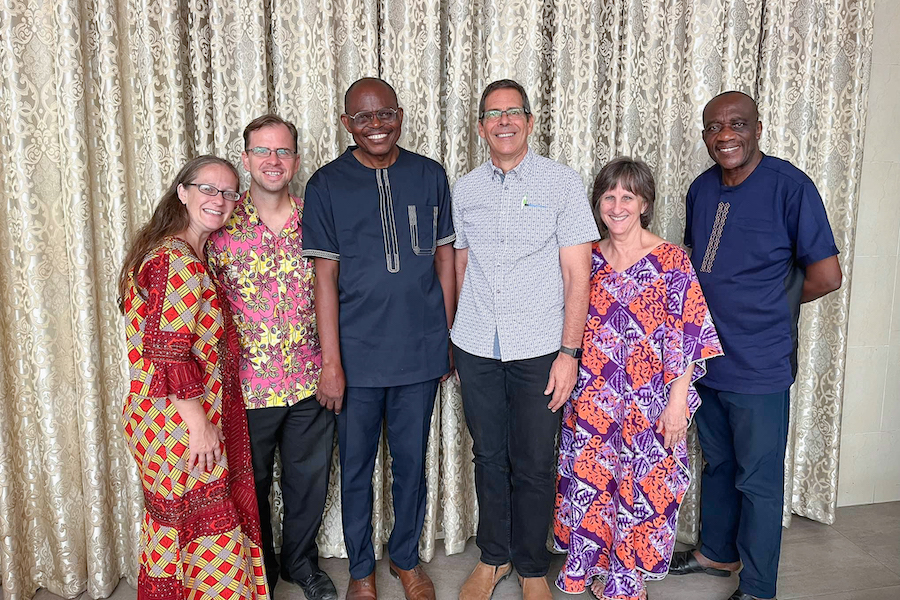
The Kuglin family has served the DRC alongside others for the past seven years.
Another reason this story-telling method of sharing the Gospel is effective is because many of the Congolese do not have the Bible in their own language. While French is the official language, Kuglin said there are about 240 languages spoken in the country.
The Kuglins have a partnership with the Seed Company, part of the Wycliffe Bible Translators organization. Through that, they participate in two-year projects where they visit larger villages around the country, and every few months invite people from surrounding villages together to translate the spoken Bible stories into their own languages. The representatives from each language focus on about 35 stories that they record in their language, called their first scripture.
Wycliffe then comes later to evaluate if they will then translate the entire written Scripture into their language, a process that can take decades.
“Most of those people in those groups are without a written Bible,” Kuglin said. “They have access to the Bible in one of those big languages, French, Lingala, Swahili, that kind of thing, but they don’t have it in their mother tongue. So that’s what we’re doing.”
Of the 240 languages found in the Congo, Kuglin said they have touched about 100 of the smaller languages with this approach of first scripture, and now some of those are working towards having a translation of the Bible.
Kuglin said this is a rigorous process that Southwestern also prepared him for as he and other seminary-trained men consider the original languages of the Bible when they listen to the recordings of the translated stories, checking to make sure they tell the Bible in the proper way with correct terms and clear understanding of the intent of the scripture.
“And we get very quickly into Bible truths and things like that with these people, and it creates a thirst or a hunger for more,” Kuglin said, adding that a 15-year translation project would give them a Bible the people are not used to reading, studying, or sharing from. “…They can read, yes, but it’s not like making Him alive, like dynamically, mouth-to-ear does. We’re seeing some really great church movements happening in the villages through this kind of thing, and the pastor will come back and say, ‘You’ve given my people a way to speak about God outside of the church, very naturally.’”
Kuglin said moving forward they hope to see more people come to partner with them as missionaries, as well as national partners work with them even more as they train up Christians locally to take up the mantle and use the truths of Scripture to counteract false teaching.
